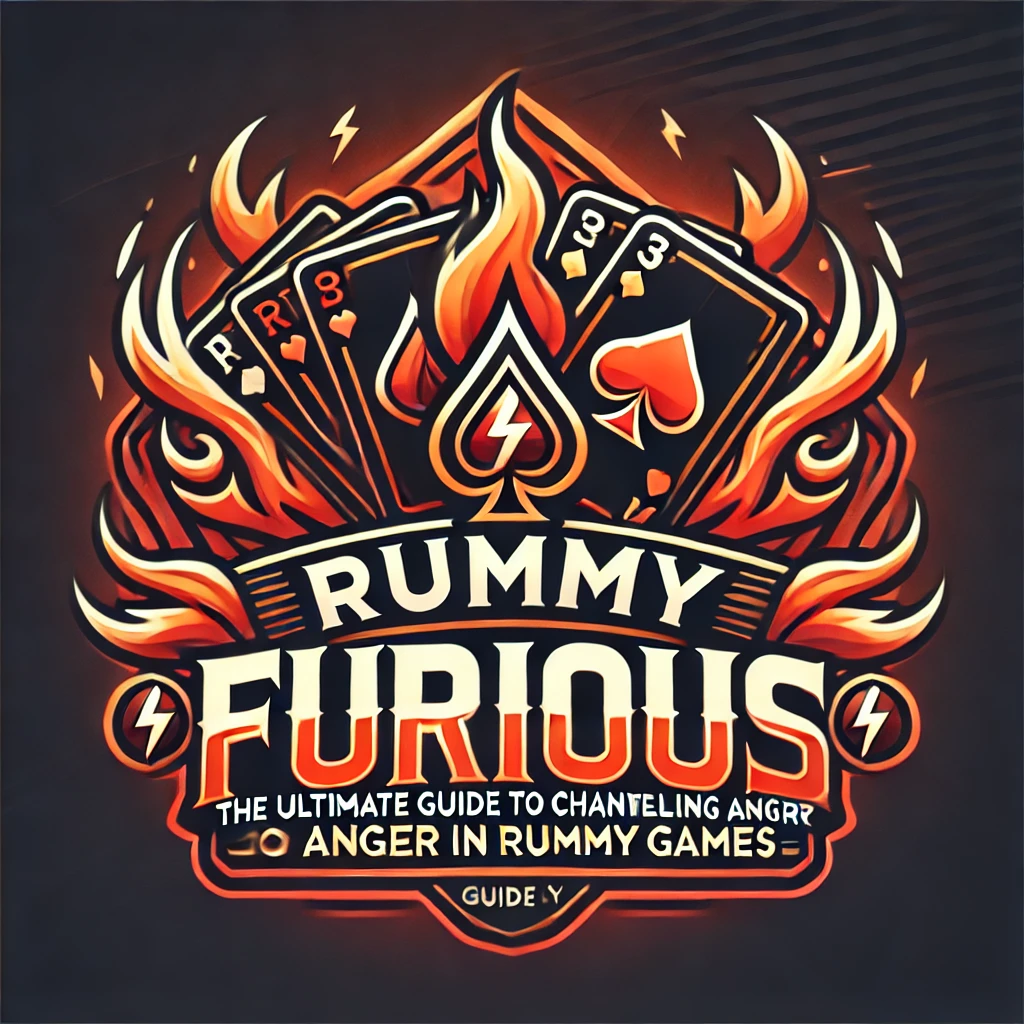Description
A Complete Guide to Managing Anger in Rummy Games Rummy is a well-liked card game that blends strategy, skill, and a little bit of luck. It can elicit strong emotions, especially frustration and anger, even though it can also be a fun pastime. For players who wish to continue having a good gaming experience, it is essential to comprehend the cause of these emotions. Because rummy is a competitive game, players frequently experience elevated emotions, particularly when they believe the game is unfair or they are not playing well.
Anger can be triggered by things like losing streaks, bad card draws, or perceived errors made by opponents. Also, since interpersonal relationships may affect how players respond to one another’s actions, the social dynamics of playing with friends or family can intensify these feelings. Also, the psychological component of competition is a major factor in the development of rage during rummy games.
A player’s high expectations for their performance can cause disappointment if they are not fulfilled. This disappointment can easily turn into annoyance, particularly if players believe that other people’s actions or chance are undermining their abilities. The first step to effectively controlling anger is to recognize these triggers. Players can start to create coping mechanisms to manage their emotions and keep up a more pleasurable gaming experience by realizing that emotions are a normal part of competitive play. Players can employ a number of techniques that encourage a more optimistic outlook in order to effectively manage their frustration during rummy games.
Before the game starts, one good strategy is to establish reasonable expectations. Players can lessen the strain they put on themselves by accepting that losing is a natural part of the game and that winning is not assurance. The game can be played more casually thanks to this mental change, which makes it simpler to enjoy the process rather than focusing only on the result. Also, players can lessen their frustration when things don’t go as planned by reminding themselves that the main goals of rummy are enjoyment and social interaction. Mindfulness is another helpful tactic to use when playing games. Players who practice mindfulness are encouraged to focus on the here and now rather than worrying about the past or the future.
Players can keep a composed attitude by using strategies like concentrating on the cards at hand, watching opponents’ moves objectively, & enjoying the social aspects of this game. Players can better control their emotional reactions and stop frustration from turning into rage by developing an awareness of their thoughts and feelings. This proactive approach not only improves the gaming experience but also cultivates a more positive competitive mindset.
During rummy games, deep breathing exercises and relaxation methods are effective strategies for controlling rage & frustration. Players frequently experience physical symptoms like tense bodies and elevated heart rates when their emotions are running high. Players can counteract these physiological reactions and encourage calmness by engaging in deep breathing exercises.
A straightforward method is to take a deep breath through the nose for four counts, hold it for four more, and then slowly release it through the mouth for six counts. This cycle can be repeated multiple times to help reduce stress and improve concentration while playing games. Emotional regulation can be further improved by using relaxation techniques like progressive muscle relaxation in addition to deep breathing. This technique helps relieve accumulated tension and fosters calm by methodically tensing and then relaxing various body muscle groups. Players can keep their composure throughout the game by using this technique during breaks or even in between rounds. Players can make the gaming environment more pleasant for both themselves and their opponents by incorporating these relaxation techniques into their daily routine.
Understanding when to stop playing rummy is crucial to properly controlling your emotions. Constant play, particularly when agitation or frustration is high, can impair judgment and intensify unpleasant emotions. If players see indications of growing rage or frustration, they should be aware of their emotional state and prepared to leave the table.
People can refocus, consider their emotions, and return to the game with a more lucid mindset after taking a break. Also, players can take advantage of breaks to practice self-care techniques that support emotional health & relaxation. Whether it’s taking a quick break from the game to enjoy some fresh air, have a quick snack, or have a casual chat with other players, these breaks can help players feel better when they return to the game. Gamers can increase their enjoyment of rummy while lowering the possibility of conflict or unfavorable interactions with others by making breaks a priority during the gaming session. In order to prevent conflict during rummy games, effective communication is essential. Players ought to make an effort to keep the lines of communication open with their rivals and respectfully share their opinions.
Dealing with annoyances that come from perceived unfairness or miscommunications during gameplay in a cool, collected manner can stop them from turning into rage. This strategy promotes conversation rather than conflict. For example, if a player believes an opponent made an unfair move, they may say something like, “I noticed that move seemed unexpected; could you explain your thought process?”.
Setting ground rules before a game begins can also help players understand what is expected of them in terms of behavior & communication. Mutual respect and a spirit of teamwork are fostered when disagreements or misunderstandings are resolved beforehand. When everyone agrees on what constitutes appropriate behavior, it’s simpler to deal with problems without losing your cool. Players can foster a more peaceful gaming environment that increases enjoyment for all participants by placing a higher priority on effective communication. It is essential for emotional health to find constructive ways to express anger outside of rummy games.
Physical activities like sports or exercise can be great ways to transform frustration into something positive. Physical activities such as swimming, running, or even team sports offer a way to let off steam and improve general health. These channels have been shown to enhance mood and mental clarity in addition to reducing anger.
Creative endeavors are also useful ways to deal with anger. People can constructively express their emotions through artistic endeavors like painting, writing, or music-making. Players can acquire perspective on their frustrations and create healthier coping strategies by directing their emotions into creative pursuits.
People can better process their emotions and return to rummy games with a renewed perspective when they find constructive outlets outside of the game, whether it be through exercise or artistic expression. Approaching friends & family for support is a great way to deal with rummy-related emotions. Talking about experiences with loved ones can help you get perspective & feel validated when you’re feeling angry or frustrated.
Open communication about feelings enables people to process their feelings in a safe space and get support from others who are sympathetic to their plight. Friends and relatives may also provide beneficial counsel or tactics based on their personal encounters with comparable circumstances. Incorporating friends and family into gaming sessions can also foster a more encouraging environment all around.
Navigating obstacles together is made easier when playing with loved ones who are aware of each other’s emotional triggers and tendencies. Creating a supportive environment in gaming communities promotes friendship and lessens the possibility of disputes resulting from miscommunications or annoyances. Players can more fully enjoy rummy games and strengthen their emotional resilience by relying on their support system.
It’s crucial for emotional control and personal development to think back on angry outbursts during rummy games. One can gain important insights into their emotional reactions by taking the time to examine what caused frustration or conflict during gameplay. Reflective practice promotes self-awareness & assists people in recognizing behavioral patterns that may contribute to negative emotions.
Players may think about questions like: What specific actions led to my anger? How did I react? What could I have done differently?
Also, by drawing lessons from these encounters, players can create better coping mechanisms for games in the future. People can take proactive steps to better control their emotions the next time by identifying triggers & comprehending how they affect them emotionally. In addition to improving emotional intelligence, this never-ending cycle of introspection and education makes gaming more pleasurable in general.
In the end, players are better equipped to handle the challenges of competition with more ease and resilience when they embrace these moments as chances for personal development. To sum up, controlling anger during rummy games necessitates a multidimensional strategy that includes identifying emotional triggers, using practical coping mechanisms, practicing relaxation techniques, identifying when breaks are required, being open and honest with opponents, finding constructive outlets for anger outside of the game, asking loved ones for support, and thinking back on previous experiences for personal development. Players may create a more pleasurable environment that improves their own and their fellow players’ gaming experiences by incorporating these techniques into their daily routine.



